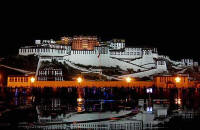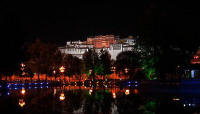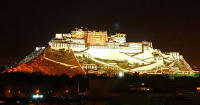|
|
Tibet Adventure Tour
Packages & Tibet Travel Advice
SCENES & SIGHTS that we take you
to these wonderful places in Tibet, starting from Lhasa
Trip Advice by Lobsan Tsering, our Tibet-born
tour guide
Lhasa, Capital City of Tibet
At an elevation of 3,700 meters, Lhasa (meaning: "Holy Place")
is capital of Tibet Autonomous Region and a famous cultural city
with a 1,300-year history. Bathed in sunshine for more than 3,000
hours a year, it is also a "Sunshine City".
Major landmarks: Potala Palace, Jokhong Monastery, Sera Monastery, Drepung Temple,
Gaindain Monastery, Norbulinka Palace. Lhasa's original look and
old lifestyle are largely intact at Barhkor Street in the old part
of Lhasa, where all sorts of arts and crafts are on sale. Lhasa is
linked with Beijing, Chonqing, Chengdu, Xi'an and Kathmandu by
airlines. The Xining Lhasa and Chengdu-Lhasa highways also provide
major accesses to Lhasa.
Potala Palace, Lhasa, Tibet
Potala Palace in downtown Lhasa is a 41-hectare complex which
came under construction during Songtsan Gambo's 7th-century
Tibetan reign.
Consisting of White Palace and Red Palace, with nearly 10,000
rooms, it was where the Tibet religious Dalai Lamas lived and handled political
affairs. Housed in this castle-like palace are a wealth of
Buddhist statues, murals, religious scriptures, and treasures in
Tibet. As
a precious legacy of Tibetan culture, the Potala Palace is a
UNESCO-endorsed world cultural heritage site.



(Beautiful Potala Palace at night. Click to view large photos.)
Jokhong Monastery, Tibet
Jokhong Monastery, built in 647 as the earliest wood-masonry
structure in Tibet, is dedicated to a statue of Sakyamuni. It is
also in the possession of a collection of cultural relics dating
back to the Tang, which include statues of Songtsan Gambo of Tibet and
Princess Wencheng of Tang. Tang architectural elements are palpable in
this monastery, a splendid four-floor building facing west under a
gilded rooftop.
Xigaze, Tibet
A 500-year-old cultural city 3,800-metre above sea level,
Xigaze is the site of Benchen Lamas' residence in the Tashilunpo
Monastery. The world-famed Mount Qomolanma (8,848.13 meters)
stands to the south of the city. The emblem of the city is the
Tashilunpo Monastery, established in 1447, where the fourth
Benchen Lama and his successors resided and conduct political
activities. Covering a floor space of 300,000 square meters, the
monastery is enshrined with the world's largest gilded bronze
Buddhist statue, the 22.4-metre-high statue of Champa.
Nyingchi Prefecture, Tibet
Nyingchi is a prefecture in the lower reaches of Yarlung Zangbo
river. At an average altitude of 3,000 meters above sea level, it
is home to Monbas, Lobas and some other ethnic minorities marked
for their peculiar habits and custom of Tibet. Mount Namjagbarwa and the
Yarlung Zangbo, 496.9 km long and 5,382 meters in maximum depth
and believed to be the world's largest canyon, are the most
alluring of all the tourist resources in this prefecture.
Shannan Prefecture, Tibet
Shannan, a prefecture 3,600 metres above sea level and with a
mild climate in the middle reaches of the trunk Yarlung Zangbo
River, was the cradle of the Tibetans. Among Shannan's cultural
relics are Samye Monastery, Tombs of Tibetan Kings (Songtsan Gambo
included), Chang-zhug Temple, and Yarlung River, a mysterious and
breathtaking national scenic zone that showcases Tibet's snow
mountains and glaciers, idyllic pastoral farms, alpine vegetation,
historical sites, and folkways.
Ngari Prefecture, Tibet
Situated in northwest Tibet 4,500 meters above sea level (hence
the "Top of the Roof of the World"), Ngari prefecture is sparsely
populated and studded with lads and a paradise of such wildlife as
yaks, antelopes and wild donkeys. The ruins, and the holy mountain
and lake of the fable Guge Kingdom are found in Tibet.
Nagqu Prefecture, Tibet
Access to the northern Tibetan prefecture of Nagqu at an
elevation of above 4,500 meters is made convenient by Xining-Lhasa
Highway which runs right across it south and north. The exotic
scenery of the holy lake of Namco (4,718 meters above sea level)
combines with the unique lifestyle of the nomads to form an
unusually idyllic landscape in this prefecture of Tibet.
Qamdo Prefecture, Tibet
The charming, fertile and vast land of Qamdo Prefecture
embraces Hengduan Mountain, and Jinsha, Nujiang and Lancang
rivers, and holds forth the fascination of wooded mountains, dense
forests, age-old history and original folkways of Tibet.
Exploratory Expeditions,
Tibet
Awesome mountains, an unpredictable climate, rapid rivers,
alpine lakes, trackless jungles, and peculiar folklore are reasons
why Tibet has caught the fancy of so many nature explorers,
adventurers and mountaineers, who may contact travel services in
Tibet for details of their prospective tours.
|

